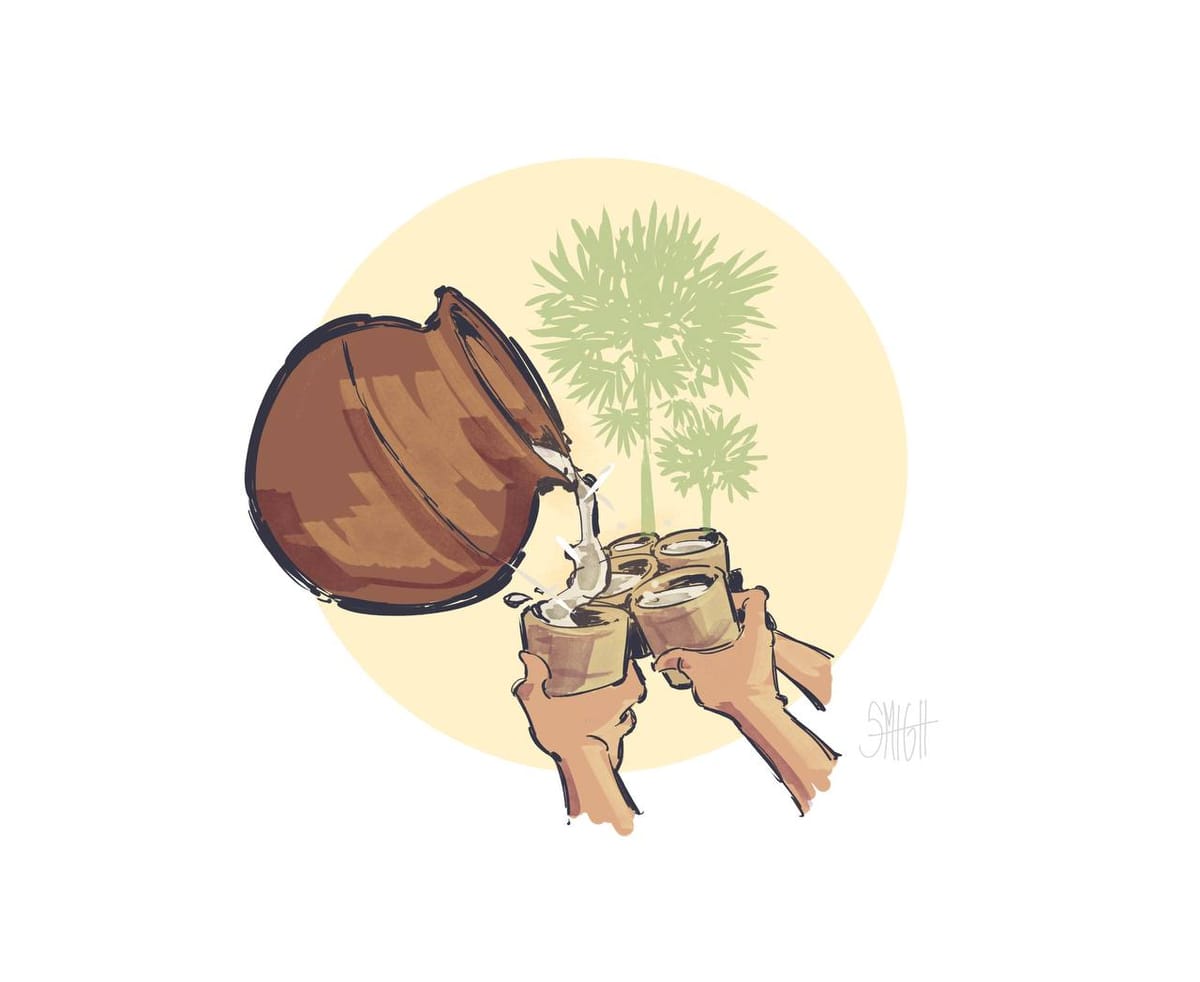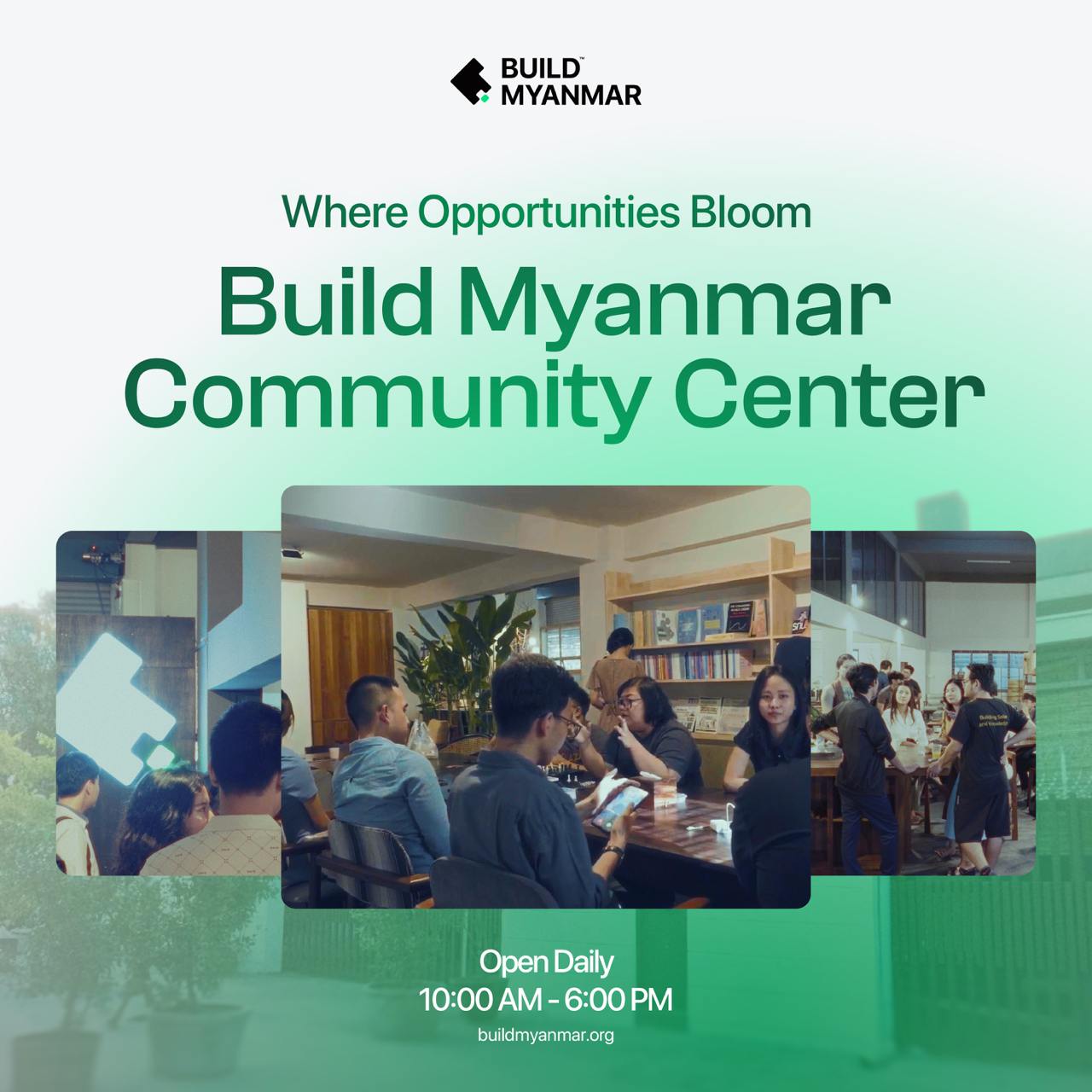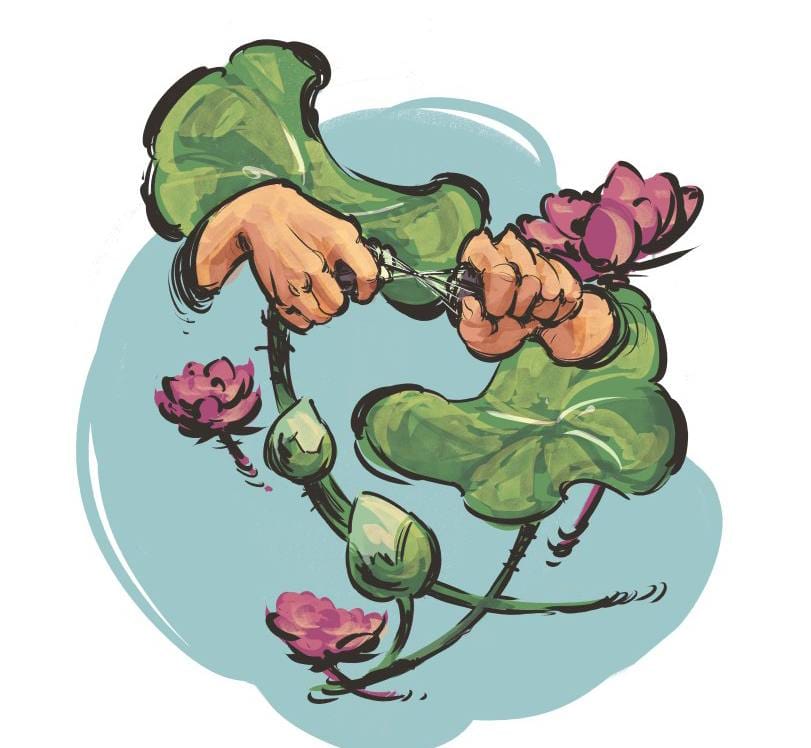
The car cruises along the Yangon-Kautmu road. On either side of the swiftly moving vehicle, green paddy fields stretch into the distance. Behind these fields stand tall palm trees, their silhouettes stark against the sky. Soon enough, small palm wine shops appear along the roadside.
Inside one of these shops, a small group of people, both young and old, can be seen sitting together, enjoying palm wine. Even in this era where alcoholic beverages like beer, cocktails, wine, and gin are widely available, Myanmar palm wine still maintains its loyal following.
While some drink palm wine for its taste, others drink it for pleasure. There are also those who view palm wine consumption negatively. Whatever the case, it's worth considering how palm wine could benefit Myanmar, especially after Japanese sake was added to UNESCO's list in December 2024.
The Palm Tree
It takes 10-15 years for a palm tree to mature. There are male and female palm trees. They thrive in hot, dry climates with annual rainfall between 20-40 inches. This is why palm trees are abundant in Myanmar's central dry zone. One advantage is that palm trees don't require fertilizers, pesticides, or extensive irrigation. Thus, they can be cultivated not only in the central regions but anywhere in the country with non-waterlogged soil.
Male palm trees start producing sap after 7 years, while female trees take 10 years. When boiled down, sap from male trees produces slightly darker jaggery, while female tree sap yields white jaggery.
Palm trees also provide various materials for human use. Examples include palm hats, palm mats, palm wood furniture, and roofing materials from palm leaves. For skilled craftsmen, every part of the palm tree has its use.
Palm Wine in Myanmar's Culture
Palm wine is a beverage derived from palm tree sap. In Myanmar's culture, it wasn't a drink for royalty but rather a commoner's intoxicant for relaxation. However, this doesn't mean that kings, princes, and nobles never drank it – some did, while others abstained.
In Myanmar's cultural context, palm wine consumption is often portrayed negatively in religious texts, literature, films, and music. Movies frequently depict excessive palm wine consumption leading to mistakes. However, in today's world, overconsumption of any alcoholic beverage, not just palm wine, can lead to poor decisions.
Myanmar literature contains numerous terms related to palm work, such as "yin-htaung" (palm climbing setup), "yin-swe" (palm sap collection), "hmyu-oh" (fermentation pot), and "nyaung-say-kya" (palm sap dripping). There are also Myanmar proverbs involving palm wine, such as "Like a buffalo climbing a palm tree when drunk with palm wine."

Where Opportunities Bloom
Myanmar – a place where creativity, learning, and connection come together. The Build Myanmar Community Center is the ultimate solution for youth seeking inspiration and opportunity.
This innovative center offers:
- Fully-equipped spaces with high-speed internet
- Flexible co-working areas for collaboration
- Networking opportunities
- Diverse workshops led by experts from various fields
- A comprehensive library for knowledge seekers
- Maker spaces to fuel creativity and innovation
Interested in transforming your potential? Explore the link below and discover a world of possibilities.
In ancient times, people used palm-related terms to tell time, such as "sun-at-palm-height." Terms for palm products like "palm-mat" and "palm-hat" are still in use today.
Minister Padethayaza's classical verse "When mist rises in early summer..." vividly depicts the life of palm tappers and their families.
Through these examples, we can clearly see how palm-related work has been deeply embedded in Myanmar's social life.
The Sake Example
In December 2024, during a UNESCO meeting in Paraguay, Japanese sake production methods were designated as Intangible Cultural Heritage. Upon this announcement, the Japanese representative proudly took a ceremonial sip of sake at the meeting.
Sake is Japan's traditional rice wine. Among foreigners, it's known as "Japanese Rice Wine." Japanese sake contains 10-20% alcohol content.
In Japan, sake is more than just traditional alcohol. It's the most popular and widespread alcoholic beverage. Japanese people consider sake essential not only at guest receptions, celebrations, and traditional festivals but also in daily social interactions.
This is why Japan has actively promoted sake production domestically. They hold annual competitions to select the best sake, with over 110 competitions held to date. Each year, nearly 1,000 different sakes compete. Sake from Yamagata Prefecture, which often wins these competitions, is particularly famous in Japan.
The Japanese have expanded sake beyond domestic markets to international ones. A sake brewery in Niigata, central Japan, has been allowing tourists to visit their production facility for the past 8 years. This has helped international visitors become familiar with sake production methods and quality.
Asahi Shuzo, the company behind the famous Dassai sake brand, is even planning to send sake ingredients to the International Space Station for production. If this project succeeds, a 100ml bottle of sake could cost 100 million yen (approximately $653,000).
Observing how Japanese sake has been elevated to a global product, it's worth considering whether Myanmar's palm wine, deeply rooted in traditional culture, could also achieve UNESCO recognition and market success.
Making Myanmar's Palm Wine Global
To make Myanmar's palm wine globally marketable, experts and local palm farmers should meet and discuss strategies. They need to study palm farmers' challenges, requirements, and why some might be switching to other occupations.
The most crucial factors for global market entry are raw material availability and market demand. Palm farmers are essential to this project as they ensure raw material supply.
First, before attempting international market penetration, systematic domestic production and market viability must be established. Currently, "Hmyu" brand palm wine is available in the domestic market, bottled like beer.
Such local product development should be encouraged. The domestic market needs to expand with state support. Additionally, practices like the 2018 wholesale purchase of palm trees by Chinese businesses should be prevented.
Regulations and support systems should be implemented to encourage more palm wine production businesses. Simultaneously, since palm wine isn't unique to Myanmar, examples from other countries should be studied.
This could help palm wine gain prominence in both domestic and international markets as a beer alternative. This approach isn't unique to Myanmar – Japan has sake, and Korea has soju.
What advantages does Myanmar palm wine have for UNESCO recognition and global market entry? Firstly, palm wine has been integral to Myanmar's social life for centuries.
Rural palm wine production methods are notably natural. In modern terms, it's truly organic. The process involves cutting palm shoots, collecting sap drops in bamboo containers or pots overnight. By morning, palm wine is ready. It comes in sweet and bitter varieties, with sweet wine in the morning turning bitter by afternoon. Both production methods are entirely natural.
Additionally, palm wine offers health benefits. It promotes cardiovascular health, improves vision, helps fight cancer, benefits hair and skin health, aids liver conditions, and improves urination. It contains antioxidants, Vitamin C, and Vitamin B1, which enhance vision. More systematic health research is needed to attract greater interest.
Eco-tourism related to palm wine industry could also be considered. How can we accommodate tourists interested in palm climbing? How can we explain palm wine production to interested visitors? How can we arrange hands-on palm wine production experiences? How can we showcase the lifestyle among palm groves? These aspects deserve consideration.
Furthermore, selling palm-related souvenirs, food items, and palm wine food pairings that appeal to international tastes should be explored. Regarding food, since Myanmar cuisine often faces criticism for hygiene, this aspect requires special attention.
With systematic planning and comprehensive supply chain management, Myanmar palm wine could potentially become a global market product.
Is it easy? No. But no product enters the international market easily. Success requires proper preparation, methodical execution, and seizing opportunities.
The first step toward success might be challenging, but it's worth exploring.
By Han Thit Ein (Y3A)
Read More:
 Build Myanmar - MediaY3A
Build Myanmar - MediaY3A
 Build Myanmar - MediaY3A
Build Myanmar - MediaY3A
Build Myanmar-Media : Insights | Empowering Myanmar Youth, Culture, and Innovation
Build Myanmar-Media Insights brings you in-depth articles that cover the intersection of Myanmar’s rich culture, youth empowerment, and the latest developments in technology and business.
Sign up for Build Myanmar - Media
Myanmar's leading Media Brand focusing on rebuilding Myanmar. We cover emerging tech, youth development and market insights.
No spam. Unsubscribe anytime.
Sign up now to get the latest insights directly to your mailbox from the Myanmar's No.1 Tech and Business media source.
📅 New content every week, featuring stories that connect Myanmar’s heritage with its future.
📰 Explore more:
- Website: https://www.buildmyanmarmedia.com/
- Facebook: https://www.facebook.com/buildmyanmar
- YouTube: https://youtube.com/@buildmyanmarmedia
- Telegram: https://t.me/+6_0G6CLwrwMwZTIx
- Inquiry: info@buildmyanmar.org
#BuildMyanmarNews #DailyNewsMyanmar #MyanmarUpdates #MyanmarNews #BuildMyanmarMedia #Myanmarliterature #myanmararticle #Updates #Insights #Media
